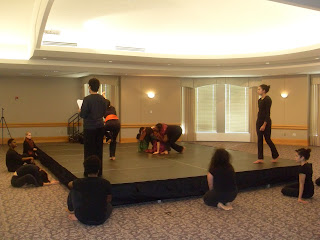African Women Connect (AWC)
2010 Annual Report
About AWC
African Women Connect, LLC (AWC) promotes networking and relationship building for friendship, business and community. AWC also provides opportunities for personal development, sharing information and community involvement.
The Mission of AWC is to create a network to empower women of African descent, linking them to valuable resources and promoting partnerships that strengthen individual and communal success.
The Vision of AWC is a world where African women are viewed and recognized as valuable contributors to society by themselves and others.
2010 Summary/Highlights
A total of 96 individuals attended AWC-organized events in 2010, compared to 132 in the previous year. That amounts to a decrease of 36 or %27. Of the 96, 59 or 61% were unduplicated. In 2009, unduplicated participants were 79 or 60%. The membership goal was 25 women. A total number of 16 women (of 64% of goal) signed up. Nine (9) AWC-organized events were held in 2010; four (4) fewer than 13 events in 2009. Average meeting attendance was 11; two fewer than in 2009. Thirty participants or about 50% of unduplicated participants were new to AWC. 2010 participants represented 16 different countries of origin; four (4) more than in 2009. For the first time since AWC was established, more participants originated from the East African region. In previous years, the largest group of attendees originated from the West African region. The number of participants originating from South Africa doubled from two (2) to four (4) participants. In 2010, 71% of respondents to AWC Satisfaction Survey “Strongly Agreed” that participating in AWC events were time well-spent and the remaining (29%) “Agreed.” AWC continues to operate at a loss. Income from membership and event fees were not enough to cover expenses or make a profit.
Participants
A total of 96 individuals attended AWC-organized events in 2010, compared to 132 in the previous year. That amounts to a decrease of 36 or %27. Of the 96, 59 or 61% were unduplicated. In 2009, unduplicated participants were 79 or 60%.
Members
The membership goal was 25 women. A total number of 16 women (of 64% of goal) signed up. AWC has put a hold on its membership campaign until results from the 2011 Perception Survey is reviewed and analyzed.
Members make up a bold group of women leaders who are blazing a trail by creating a new “rule book” for personal identity, professional achievement and community involvement in the African Diaspora. There are benefits provided to members. Their involvement is important to building a community we can all be proud of. Their commitment and participation in AWC efforts, events, and activities creates a better community where we can all learn, hone skills and enjoy the process of discovering who we are together, and how we can interact and work together as African women.
Events
Nine (9) AWC-organized events were held in 2010, four (4) fewer than 2009 total of 13 events. Average meeting attendance was 11, two fewer than in 2009. Thirty participants or about 50% of the number of unduplicated participants were new to AWC. 2010 participants represented 16 different countries of origin, four (4) more than in 2009. They included Cameroon, Ethiopia, Eritrea, Gambia, Kenya, Liberia, Madagascar, Nigeria, Rwanda, Sierra Leone, Somalia, South Africa, Tanzania, Togo, the Caribbean, and the United States. New from previous year were Gambia, Eritrea, Tanzania and the Caribbean.
Topics included goal-setting, ethnic food drive, community leadership, personal and professional coaching, board leadership, friendships, domestic violence and breast cancer, among other things. One of the events provided participants the opportunity to volunteer with locally-based nonprofit supporting orphans in Africa. AWC utilized and supported four (4) community businesses/organizations by hosting its events on their premises.
For the first time since AWC was established, more participants originated from the East African region. In previous years, the largest group of attendees originated from the West African region. The number of participants originating from South Africa doubled from two (2) to four (4) participants.
Satisfaction Survey
Events attendees are provided the opportunity to provide feedback after each event. In 2010, 71% of respondents strongly agreed that participating in AWC events was time well-spent and the remaining (29%) agreed as well. Comments received included (as written by the women):
· Great time meeting ladies from other parts of Africa. Dearly enjoyed the company.
· I had a pleasant time at the dinner. The women were nice, and I felt welcomed. I will try to go whenever I can.
· Got a chance to network and meet new people
· Great, met some new people, and re-connected with those I know already but have not seen for a while
· Relaxing, the more I come to AWC events and meet like-minded people, the more reason I do not want to miss any of their events.
· It was great to connect with old friends and new people. There was a lot of energy in the room. Great Vibe!
· I met new and existing African sisters. The atmosphere was relaxed and inviting to conversations and getting to know the women in attendance.
· It feels so good to be surrounded by such kind, intelligent women. I had a fun night, "I was not faking it".
· It was great to see such a diverse group of accomplished African women.
· Had a great time meeting many new women from varied backgrounds
· Sisters Gathering over Meal. Splendid!
· It was great. Inspiring.
· Was an informative evening
Financial
AWC continues to operate at a loss. Income from membership and event fees were not enough to cover expenses or make a profit. We continue to investigate strategies to help us break-even and eventually become profitable. Imagine what we could achieve with financial support! We remain optimistic.





